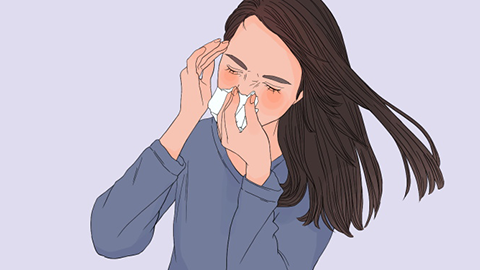What are the symptoms of allergic rhinitis?
Generally, the main symptoms of allergic rhinitis include nasal itching, sneezing, runny nose with clear nasal discharge, nasal congestion, and reduced sense of smell. If discomfort symptoms occur, it is recommended to seek timely diagnosis and treatment at a regular hospital. Detailed analysis is as follows:
1. Nasal Itching
After allergens such as pollen and dust mites come into contact with the nasal mucosa, they trigger the immune system to release histamine, which stimulates the nerve endings in the nasal cavity, causing nasal itching. Patients often frequently rub or pick their nose with their hands, and the sensation of nasal itching suddenly worsens after exposure to allergens. Some patients may also experience itchy eyes and a sore throat.
2. Sneezing
Histamine stimulates the sensory nerves of the nasal mucosa, triggering reflexive sneezing. Patients often experience paroxysmal sneezing, with several or even a dozen consecutive sneezes at a time. Sneezing episodes are more frequent upon waking in the morning or after exposure to allergens. Runny nose with clear nasal discharge often follows sneezing.

3. Runny Nose with Clear Nasal Discharge
Inflammation stimulates the nasal mucosal glands, causing abnormal excessive secretion and resulting in a large amount of clear nasal discharge. The nasal discharge is transparent and thin, often unconsciously flowing from the nostrils, requiring frequent wiping. In severe cases, it can soak through tissues and affect daily life.
4. Nasal Congestion
Inflammation causes congestion and edema of the nasal mucosa, narrowing the nasal passages and causing nasal congestion. Nasal congestion can occur on one or both sides. In severe cases, patients may need to breathe through their mouths. Nasal congestion may worsen when lying flat at night, affecting sleep quality, and some patients may develop snoring.
5. Reduced Sense of Smell
Long-term nasal congestion prevents airflow from reaching the olfactory area normally, or inflammation damages the olfactory mucosa, both of which can cause reduced sense of smell. Patients experience decreased sensitivity to odors, and in severe cases, may completely lose their sense of smell. If inflammation persists without improvement, olfactory dysfunction may persist for a long time.
In daily life, it is important to identify allergens and avoid exposure, such as wearing a mask when going out during spring and autumn to prevent pollen inhalation, and regularly cleaning indoor environments to reduce dust mite proliferation. Maintain nasal hygiene by using normal saline to irrigate the nasal cavity to relieve symptoms such as nasal itching and congestion.








